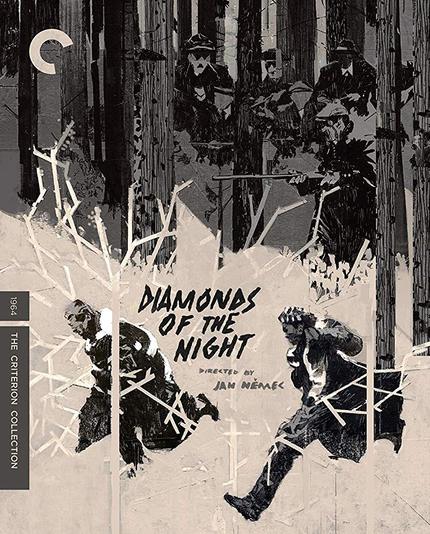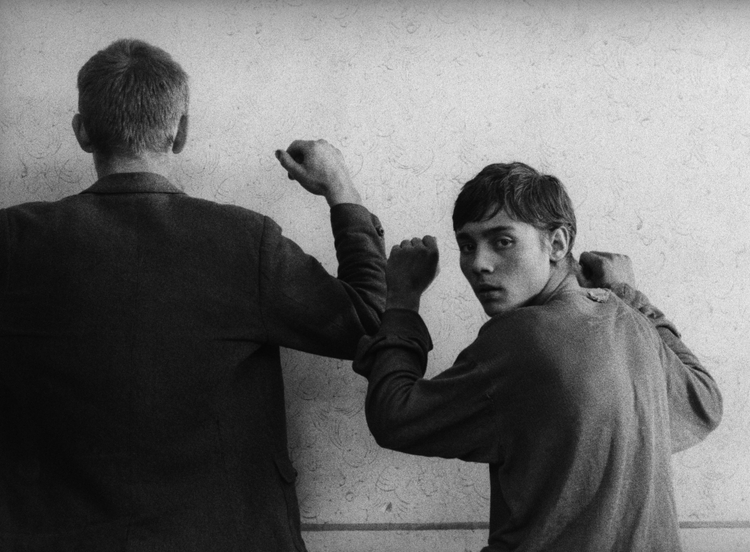Blu-ray Review: DIAMONDS OF THE NIGHT Radiates Brilliant Delirium
Czechoslovak New Wave firebrand Jan Němec's debut film is an experimental World War II tale of survival.

At only sixty-seven minutes, filmmaker Jan Němec’s 1964 debut Diamonds of the Night (Démanty noci) more than makes up for the brevity of its running time with its sheer mileage and its rough, woodsy terrain. The journey is rough indeed, a distilled tale of desperate survival amid armed pursuit. Like a month of bad sleep, or a week of no sleep at all, Diamonds of the Night won’t stop shining, even when you want it to. That goes for well after you’ve seen the film.
Narratively experimental, Němec utilizes almost primal, flash-memory editing to convey a delirium of exhaustion-fueled tragedy. Based on holocaust survivor Arnost Lustig’s book Darkness has no Shadows, it’s no oblique secret that Diamonds of the Night is a wartime tale of two teenage Jewish boys that manage to escape while being transported to a different concentration camp.
Yet, Nemec was staunch about his film not being considered a “war film”. Case in point, there is no combat, and not even any concentration camps. This film is almost all running, much of it uphill. Dialogue is some of sparsest in all of cinema; the soundtrack is dominated by the boys’ heavy breathing, the sounds of sticks and twigs snapping as they push onward. Most most ominously of all is the inescapable sound of a bell tolling.
Němec begins this film- and by extension his career- with a tremendously ambitious uphill tracking shot. Predating steadicam technology, the enormous dolly ramp needed to accomplish this, spanning a good ways through the forest before heading up an imposingly steep hillside, is shown at several points throughout the Blu-ray’s special features.
The sheer steepness of the thing explains why the actors, made to perform the harrowing run five times, look so gut-wrenchingly challenged - they truly were straining themselves. So too did whoever built that ramp, and whoever had to run the camera dolly up the thing. (Even with the reported assistance of counterweights, this was no small feat).
Němec, in his 2009 video interview (contained here as a bonus feature), notes that Diamonds of the Night operates on three basic levels: the level of reality, a level of flashbacks and memories, and a level of dreams and fantasy. It’s interesting to learn that in the course of production, he wound up needing to replace his cinematographer Jaroslav Kucera, who, he says, was particularly adept to capturing dreams and fantasy, with the more reality-rooted Miroslav Ondriček.
According to Czechoslavak New Wave authority and film programmer Irena Kovarova, who is interviewed for this Criterion edition, Nemec wound up working with the two best cinematographers that the country had to offer for his first film. And true to form, each delivered brilliant visuals within their described specialty areas. Together, we’ve got a punchy yet wandering film that’s both tactile and fevered.
As for the boys themselves (played by the late Ladislav Jánsky, who ditched acting after this in favor of career in America as a photographer for Hustler magazine, and Antonín Kumbera, who strangely vanished years ago) the camera never veers from them, even when the reality of what it’s showing us is in question. Parched, chapped, and in the case of the bigger of the two, afflicted with a bum foot, these guys are to some extent betrayed by their youth, robbed of all security and unable to stop moving forward... or upward... or any direction necessary.
Němec’s blend of hyper-focus and hallucinatory editing proved deeply unsettling for many an audience member at the time. Since Diamonds of the Night dropped in 1964, its confidently palpable techniques have become far more commonplace (see: the film’s of Nicholas Roeg, for one), though for this film, that simply means that experiencing it is generally less mentally exhausting, though no less engaging.
Criterion’s Blu-ray presentation of the film’s new 4K restoration certainly assists with this, as Diamonds of the Night appears particularly stunning, especially for a decades-old third-world film that no doubt got shoved aside amid political shufflings five years on. Besides the already-mentioned interviews, Criterion also includes two short films by Němec.
The first is another Lustig adaptation that predates the feature presentation, 1960’s A Loaf of Bread. A taut little story of a young man’s attempt to steal a loaf of bread for his planed escape from his concentration camp, Němec does everything right in terms of weaving basic, palpable suspense. It’s all the more impressive that this is his student thesis film.
The second short film by Němec is considerably newer, and an altogether different aesthetic and format. Shot on video (which the filmmaker would take to increasingly in his later years) and tracking Lustig himself as he goes back to places of his youth, Arnost Lustig Through the Eyes of Jan Němec is a not unengaging documentary testimonial by the late author.
Though Lustig tells the unseen Němec that he would never be retracing these steps if it weren’t for the director persuading him to do so for this TV project, he’s still clearly moved by certain places, particularly those related to a prostitute and his first sexual experience. He’s quite hung up on that, in fact. Němec simply drifts about with the camera, reverential all the while.
Jan Němec died in 2016 following a bizarre, multinational career that managed to circumvent whatever acclaim he’s due. He’s remembered in hyperbolic terms: “the enfant terrible” of Czechoslovak New Wave (don’t call it “Czech New Wave,” historian Irena Kovarova admonishes), the filmmaking wild card of his scene, and an unruly visionary troublemaker who’s too-smart lack of conformity ran him afoul once the Soviets took control of the country in 1969.
Indeed, though ostensibly a World War II story, there’s no denying the prevalence of contemporary politics symbolically contained in Diamonds of the Night. Czechoslovak New Wave was strikingly political, and Němec, though arty and subversive, was no exception.
Though revolutionary, brazen and innovative, Němec never had a career compatible to his national cohort Milos Forman, or some of the others. But hopefully, thanks to this release and others like it, the world can awaken fully to this most noteworthy director. Shine on Němec, you crazy diamond.
Diamonds of the Night
Director(s)
- Jan Nemec
Writer(s)
- Arnost Lustig (story "Darkness has no Shadows")
- Jan Nemec
Cast
- Ladislav Jánsky
- Antonín Kumbera
- Ilse Bischofova
- Ivan Asic








